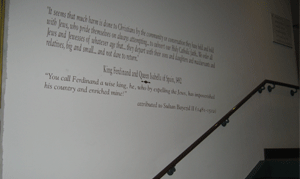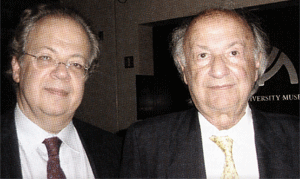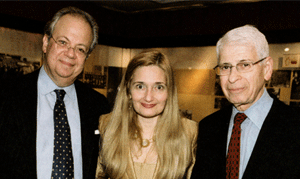"The Ottoman Mentality Was Always An Educated One"

One of Dangoor's remarkable pieces of work is still on the wall of The Center for Jewish History building.
At the end of lunch, the old guy looked into the young man’s eyes and told him: “You have to do it.” The young man couldn’t turn the older one down and he accepted his offer by saying,“Yes, I have to do it.” The old man, Leon Levy, who served as president from 1982 to 2001, convinced David Dengoor to become the fifth president of American Sephardi Federation in 2003.
Leon Levy was born in Seattle, Wash. to Sephardic Jewish parents who emigrated from Turkey. He believed that the history of Jews in Turkey was an essential one. Under his leadership, the American Sephardi Federation had very tight relations with Turkey.
Currently president of the federation, David Dangoor was born in 1949 to Jewish parents who emigrated from Tehran to Sweden. Before moving to Tehran, the members of his families had lived in Iraq many years. His great-grandfather was chief rabbi of Iraq in 1900’s. His mother’s side is Austrian Sephardic Jews.
In 1922, when Iraq was created by British, the Jewish community protested it. The Dangoor family was among the Iraqi Jews who protested to the British: “You have no right to make us Iraqis. We are Turks. How can you take our Turkish nationality and convert us into a country in which we have no stake?”
In 1922, approximately 120,000 Jews, accounting for one third of Baghdad’s population, were living in Baghdad. The Jewish population in Iraq was 148,000 in 1948 and it decreased to 35 in 2004. Now it is counted at less than 10.
Dangoor says that these Jews were not Iraqis. “Just like today, when you ask a Kurd in Iraq where he is from, he never says that he is Iraqi; he says he is a Kurd. It was the same in the Jewish community in Iraq as well,” he adds.
Where did the Iraqi Jews come from? According to Mitchell Bard, director of the Jewish Virtual Library, the world’s most comprehensive online encyclopedia of Jewish history and culture, in 722 B.C.E., the northern tribes of Israel were defeated by Assyria and some Jews were taken to what is now known as Iraq. A larger community was established in 586 B.C.E., when the Babylonians conquered the southern tribes of Israel and enslaved the Jews.

WHEN DID THE FIRST SEPHARDIC JEWS ARRIVE IN THE UNITED STATES?
According to sources, the first Sephardic Jews arrived in the U.S. in 1654. There are between six and seven million Jews living in America today. First Sephardic Jews were originally Portuguese and they came by way of Brazil. In that time a big section of Brazil belonged to the Dutch, but the Dutch lost this territory to the Portuguese. So Jews moved from Portugal to Brazil. 23 Jews ended up in New Amsterdam, a 17th-century Dutch colonial settlement that later became New York City. They started to establish the first Jewish congregation.
Dangoor says that actually the first Jew came to the U.S. with Christopher Columbus in 1492: “The navigator was a Jew. It’s very strange that they left in the morning of the execution (of Spanish King Ferdinand’s order). The ship was full of Jews. If you go to any Caribbean island, you will see signs of Jewish communities from that time. So the Jews went two ways in 1492. They went west to find another way to India and Latin America, and a very large chunk of them went to Turkey.”
For Dangoor, today the biggest problem with Sephardic Jews is that they assimilated. “They consider themselves Jewish, but they are less active in Jewish life,” he says.
Under Dangoor’s leadership, American Sephardi Federation, along with Sephardic House, has published a new magazine, The Sephardi Report. Working hand in hand with the Director, Esme Emmanuel Berg, they have succeeded in making the American Sephardi Federation, with Sephardic House, an increasingly important partner and representative of Sephardic history and heritage at the Center for Jewish History.

One of Dangoor’s remarkable pieces of work is still on the wall of The Center for Jewish History building, on 16th street between 5th and 6th Avenue in New York City. On the second floor wall inside the building, there is a huge map of Spain. Next to the map there are quotes from King Ferdinand and Sultan Bayezid. The Sultan’s quote is: “You call Ferdinand a wise king, he, who by expelling the Jews, has impoverished his country and enriched mine!”
Engraving Sultan Bayezid’s quote on the wall was Dangoor’s idea. Mehmet Samsar, Turkish Consul General to New York, participated in the unveiling ceremony of the engraved quote on the wall.
He empathizes that the Ottoman mentality was always an educated one and he adds: “The saving of the Spanish Jews was a very positive influence that the Ottoman Empire had on the big Jewish communities that still exist all over the Middle East. Turkey saved a big chunk of the Jewish religion when the Jews came from Spain. God knows what would have happened to them if they had no place to go.”
TRIPLE AFFECTION FOR TURKEY
Dangoor said he had a triple affection for Turkey. The first one owes to the fact that though he was born in Sweden, his family called themselves Turks. The second one is for a famous Turkish dish, cabbage dolma (stuffied cabbage). This is a Swedish national dish as a result of Charles XII, King of Sweden from 1697 to 1718, staying in İstanbul for five years as a prisoner of war. Dangoor says there is a very famous quote in Sweden that when the King came back from Istanbul after five years, they asked him how it was to be a prisoner of war of the Ottomans. He said: “My life as a prisoner of war was much better than my life as King of Sweden.”
The third reason for Dangoor’s affection is that he grew up in Sweden in the 1950s and 1960s where there was always a strong Turkish presence Turkey in terms of diplomatic relations. In that time, there were not many Middle Eastern people in Sweden. When his father came to Sweden in 1949 for the first time, he had a picture of front page of a newspaper that announced that Middle Eastern businessmen had arrived in Stockholm.
In the 1950s and 1960s, when Turkish ambassadors came to Sweden, there were no people to help facilitate their stay. Dangoor says: “So they always found my father. So I grew up with every Turkish ambassador, participated in every event at the Turkish Embassy. My father was actually the man who helped the Turkish ambassador in 1965 to find a house in Sweden which is now the Turkish Embassy.”
At the time, the Turkish ambassador to Sweden was Mehmet Benler. Dangor still keeps in touch with his son, Hasan, who live in California. He says the Federation has several members who are Turkish and his best friend is a Turkish Jew, İzak Şenbahar, the president of the development firm Alexico Management in New York City.
In addition to holding the presidency of the Federation, Dangoor runs his own consultancy company in New York. The reason he moved to the U.S. was because he joined Philipp Morris in 1976. He worked for the company in Switzerland, Germany England, Canada, then the U.S. He held an impressive array of executive positions. His wide and diverse interests include directorships of a Swedish biotech company, the Swedish-American Chamber of Commerce and the New York City Ballet.
When asked when his term as president of the Federation will end, he replies with a smile: “My term will end when I find someone. The reason I become president was that the previous president was getting older. He was begging people. One day we had a meeting. He looked at me and told me, you have to do it, and I looked at him, such a nice guy, and I told him ‘Yes, I have to’. Now I am looking for someone whom I will look in the eyes and say he has to do it.”
PRESIDENTS OF AMERICAN SEPHARDI FEDERATION
Simon Nessim (1952-1968) (remained inactive until 1972)
Prof. Daniel J. Elazar (1973-1975) (AFS officially organized)
Liliane Winn Shalom (1975-1982)
Leon Levy (1982-2001)
Mike M. Nassimi (2001-2003)
David Dangoor (2003 – Present)
Currently president of the federation, David Dangoor was born in 1949 to Jewish parents who emigrated from Tehran to Sweden. Before moving to Tehran, the members of his families had lived in Iraq many years. His great-grandfather was chief rabbi of Iraq in 1900’s. His mother’s side is Austrian Sephardic Jews.
In 1922, when Iraq was created by British, the Jewish community protested it. The Dangoor family was among the Iraqi Jews who protested to the British: “You have no right to make us Iraqis. We are Turks. How can you take our Turkish nationality and convert us into a country in which we have no stake?”
In 1922, approximately 120,000 Jews, accounting for one third of Baghdad’s population, were living in Baghdad. The Jewish population in Iraq was 148,000 in 1948 and it decreased to 35 in 2004. Now it is counted at less than 10.
Dangoor says that these Jews were not Iraqis. “Just like today, when you ask a Kurd in Iraq where he is from, he never says that he is Iraqi; he says he is a Kurd. It was the same in the Jewish community in Iraq as well,” he adds.
Where did the Iraqi Jews come from? According to Mitchell Bard, director of the Jewish Virtual Library, the world’s most comprehensive online encyclopedia of Jewish history and culture, in 722 B.C.E., the northern tribes of Israel were defeated by Assyria and some Jews were taken to what is now known as Iraq. A larger community was established in 586 B.C.E., when the Babylonians conquered the southern tribes of Israel and enslaved the Jews.

David Dangoor with Leon Levy, Honorary Lifetime President. (Courtesy of Sephardi Report Magazine)
WHEN DID THE FIRST SEPHARDIC JEWS ARRIVE IN THE UNITED STATES?
According to sources, the first Sephardic Jews arrived in the U.S. in 1654. There are between six and seven million Jews living in America today. First Sephardic Jews were originally Portuguese and they came by way of Brazil. In that time a big section of Brazil belonged to the Dutch, but the Dutch lost this territory to the Portuguese. So Jews moved from Portugal to Brazil. 23 Jews ended up in New Amsterdam, a 17th-century Dutch colonial settlement that later became New York City. They started to establish the first Jewish congregation.
Dangoor says that actually the first Jew came to the U.S. with Christopher Columbus in 1492: “The navigator was a Jew. It’s very strange that they left in the morning of the execution (of Spanish King Ferdinand’s order). The ship was full of Jews. If you go to any Caribbean island, you will see signs of Jewish communities from that time. So the Jews went two ways in 1492. They went west to find another way to India and Latin America, and a very large chunk of them went to Turkey.”
For Dangoor, today the biggest problem with Sephardic Jews is that they assimilated. “They consider themselves Jewish, but they are less active in Jewish life,” he says.
Under Dangoor’s leadership, American Sephardi Federation, along with Sephardic House, has published a new magazine, The Sephardi Report. Working hand in hand with the Director, Esme Emmanuel Berg, they have succeeded in making the American Sephardi Federation, with Sephardic House, an increasingly important partner and representative of Sephardic history and heritage at the Center for Jewish History.

David Dangoor, Carole Basri and Hy Harary at 9th International Sephardic Jewish Film Festival. (Courtesy of The American Sephardi Report magazine)
One of Dangoor’s remarkable pieces of work is still on the wall of The Center for Jewish History building, on 16th street between 5th and 6th Avenue in New York City. On the second floor wall inside the building, there is a huge map of Spain. Next to the map there are quotes from King Ferdinand and Sultan Bayezid. The Sultan’s quote is: “You call Ferdinand a wise king, he, who by expelling the Jews, has impoverished his country and enriched mine!”
Engraving Sultan Bayezid’s quote on the wall was Dangoor’s idea. Mehmet Samsar, Turkish Consul General to New York, participated in the unveiling ceremony of the engraved quote on the wall.
He empathizes that the Ottoman mentality was always an educated one and he adds: “The saving of the Spanish Jews was a very positive influence that the Ottoman Empire had on the big Jewish communities that still exist all over the Middle East. Turkey saved a big chunk of the Jewish religion when the Jews came from Spain. God knows what would have happened to them if they had no place to go.”
TRIPLE AFFECTION FOR TURKEY
Dangoor said he had a triple affection for Turkey. The first one owes to the fact that though he was born in Sweden, his family called themselves Turks. The second one is for a famous Turkish dish, cabbage dolma (stuffied cabbage). This is a Swedish national dish as a result of Charles XII, King of Sweden from 1697 to 1718, staying in İstanbul for five years as a prisoner of war. Dangoor says there is a very famous quote in Sweden that when the King came back from Istanbul after five years, they asked him how it was to be a prisoner of war of the Ottomans. He said: “My life as a prisoner of war was much better than my life as King of Sweden.”
The third reason for Dangoor’s affection is that he grew up in Sweden in the 1950s and 1960s where there was always a strong Turkish presence Turkey in terms of diplomatic relations. In that time, there were not many Middle Eastern people in Sweden. When his father came to Sweden in 1949 for the first time, he had a picture of front page of a newspaper that announced that Middle Eastern businessmen had arrived in Stockholm.
In the 1950s and 1960s, when Turkish ambassadors came to Sweden, there were no people to help facilitate their stay. Dangoor says: “So they always found my father. So I grew up with every Turkish ambassador, participated in every event at the Turkish Embassy. My father was actually the man who helped the Turkish ambassador in 1965 to find a house in Sweden which is now the Turkish Embassy.”
At the time, the Turkish ambassador to Sweden was Mehmet Benler. Dangor still keeps in touch with his son, Hasan, who live in California. He says the Federation has several members who are Turkish and his best friend is a Turkish Jew, İzak Şenbahar, the president of the development firm Alexico Management in New York City.
In addition to holding the presidency of the Federation, Dangoor runs his own consultancy company in New York. The reason he moved to the U.S. was because he joined Philipp Morris in 1976. He worked for the company in Switzerland, Germany England, Canada, then the U.S. He held an impressive array of executive positions. His wide and diverse interests include directorships of a Swedish biotech company, the Swedish-American Chamber of Commerce and the New York City Ballet.
When asked when his term as president of the Federation will end, he replies with a smile: “My term will end when I find someone. The reason I become president was that the previous president was getting older. He was begging people. One day we had a meeting. He looked at me and told me, you have to do it, and I looked at him, such a nice guy, and I told him ‘Yes, I have to’. Now I am looking for someone whom I will look in the eyes and say he has to do it.”
PRESIDENTS OF AMERICAN SEPHARDI FEDERATION
Simon Nessim (1952-1968) (remained inactive until 1972)
Prof. Daniel J. Elazar (1973-1975) (AFS officially organized)
Liliane Winn Shalom (1975-1982)
Leon Levy (1982-2001)
Mike M. Nassimi (2001-2003)
David Dangoor (2003 – Present)
Last modified onSaturday, 06 May 2017 10:07
Latest from Admin TOA
- 300 migrants to be housed at shuttered Catholic church on Northwest Side in Chicago
- Turkish Stand-Up Sensation Hasan Can Kaya Embarks on U.S. Tour with Art Evi Production, in212 Production, and TAAS New York
- "Lean Startup, To Lean Company, To Rich Exit" by Dr. Kenan Sahin is released with Forbes Books
- LOSEV USA Ramadan Campaign Let the Children Heal First with Your Ramadan Donations
- Azerbaijan Society of America Honors Centennial Anniversary of the Great Azerbaijani Politician the National Leader of Azerbaijan President Heydar Aliyev
